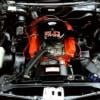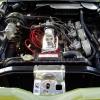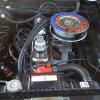
Holden brand gone
#51

Posted 18 February 2020 - 06:50 PM
#52

Posted 18 February 2020 - 07:11 PM
I reckon by the time I’m too old to drive (another 25 years if I’m very lucky) there won’t be enough interest in Toranas etc to keep the value where it is now.
As electric cars take over, petrol stations will close or convert to charging stations & fuel costs will soar. Petrol cars will either be driven by only the very rich, perhaps they'll buy up the elite cars to keep as museum pieces. The average Torana will either get scrapped, converted to electric or be kept as personal garage art, maybe driven on the rare occasion when the owner can afford to put some petrol in it.
s
Edited by StephenSLR, 18 February 2020 - 07:13 PM.
#53

Posted 18 February 2020 - 07:20 PM
Edited by yel327, 18 February 2020 - 07:25 PM.
#54

Posted 18 February 2020 - 07:29 PM
#55

Posted 18 February 2020 - 07:39 PM
#56

Posted 18 February 2020 - 07:39 PM
I have hatched a plan to save Holden. If all Australians put $1 into a fund $2 if you were not born here and $100.000.00 if your a politician (one month pay) into a saviour fund we might be able to buy out GM. They are in big shit and debit, so doing my maths we should be able to raise around 150 million. Aussies still holding up their end of the bargain within GM U.S.A get to call the shots, use top job GM staff as puppets and also get them to clean the toilets and lunch rooms. We change the name to from General Motors Holden to " Holden gm".
We move any worthwhile equipment back to Australia and start making Camaros in LHD & RHD. But put pathetic suspension in the U.S.A exports so they feel at home. Put in a Holden V8 stroked to 383ci so its not very efficient and fit LS style engine covers, they wouldn't know the difference. Aussies get the cars for close to cost be we charge the yanks extra so we get a better deal for a change.
If we put on an extra $1,000.00 on every car sent to the U.S.A and ship them 25 million cars over 5 years we all get 1,000 % return on our $1 investment. Then we send out propaganda and tell their government to heavily invest in new models, take all the money and do nothing, rip off every last bit of worth from the U.S.A arm of the company, sell every last nut, bolt or spanner. Leave all the staff entitlements for their governments to sort out. Then tell them we will close GM operations as from the next business day. And as a clincher, Holden will no longer make any LHD Camaros from this date.
Holly Shit I think this might have been done a few times before somewhere.
Do you think they (yanks) would be so laid back as us Aussies, not the first time this has happened to us. Remember Ansett from our buddies across the ditch, we all had to pay extra charges on out flights to cover the debit left behind for a few years. F**k em all.
#57

Posted 18 February 2020 - 07:47 PM
Shouldn't fuel get cheaper if no one is using it? Over supply. Less demand.
If all things were equal yes but everything will change. It's not like we're using petrol for much else, we'll still use oil but instead more will go into bitumen, plastics, etc. Less demand for petrol means less companies will be manufacturing, distributing, etc. There will be less petrol stations or perhaps one bowser every few charging stations .. if that. It will be like Avgas, you'd have to go to speciality suppliers, it won't be the essential commodity it is today.
You can compare it to when we went from dial-up internet to ADSL2+, NBN, etc. How many consumers still have dial up and if you wanted to still use it, how expensive would it be for a company to maintain all that infrastructure for a handful of users? You'd be paying through the nose for an inferior product.
s
Edited by StephenSLR, 18 February 2020 - 07:49 PM.
#58

Posted 18 February 2020 - 07:59 PM
#59
 _LXT333_
_LXT333_
Posted 18 February 2020 - 08:32 PM
Tariffs are to blame:
Here is a copy of a speech that was presented at dinner in October 2012 by Mr Mark De Wit National Vice President of the FAPM ( Federation of Automotive Products Manufacturers Association ), it makes for a very interesting read.
The automotive industry is often referred to as the “foundation” of manufacturing, leading the sector in research, industrial design & styling, engineering & product development, testing & validation, tooling & manufacture, lean production, logistics & supply chain management.....the list goes on.
But it is under severe threat. Its survival is far from certain.
And I want to touch on why we think this is the case
Let's start by having a look at the Playing Field
• In the last few years, about 1 million cars per year have been sold in Australia.
• In 2011 Australia only produced 14% of all 1 million cars sold in this country.
• 5 years ago, this was ~20%, 10 years ago was ~30% and 20 years ago this was ~53%?
• So what has changed……. I heard some self proclaimed experts on the radio saying we are not making the right cars that people want.
• RUBBISH….in fact of the 5 platforms built in Australia (Commodore, Cruze, Falcon, Territory and Camry), in 2011, 4 were in the top 10 selling cars.
• If you add up the volume of the top 10 selling cars in 2011 it equates to only 295,212 vehicles. So even if we build every one of these top 10 in Australia, we would still only be at 29% domestically produced as a ratio to total sales.
• So we produce a meagre 14% of all vehicles sold here, but if we include all export production as well, we made ~220,000 cars in total (140k domestically produced & sold + 80k for export) - so Australian total production to total sales ratio of 22%.
• Of the 1 million cars sold here, 86% are imported, with almost all ( 95%) coming from just 4 countries. Japan accounts for 44%, Thailand 21%, Korea 20% and Germany 10%.
• Let's compare our 22% production to sales ratio to these 4 countries.
• In Japan, sales of 4.4m vehicles versus production of 8.4m vehicles (190%)
• In Thailand, sales of 800,000 vehicles versus production of 1.5m vehicles (188%)
• In South Korea, sales of 1.5m vehicles versus production of 4.7m vehicles (318%)
• In Germany, sales of 3.2m vehicles versus production of 5.9m vehicles (185%)
So why are we at 22%? Why has it come down from 53% 20 years ago? What do we have to do to get it right like these 4 countries - and many others as well - from my • research, almost every other car making country has a ratio > 50% and the majority are in triple digits
Let's look at the dreaded T word....Tariff's
• For any imported car into Australia, the inbound tariff applied is 5%, unless of course we have a free trade agreement with that country (which we do with Thailand and the USA, and next year, Malaysia), where the tariff becomes zero.
But unfortunately this isn't reciprocated in return.
• If Australia tries to send a car to Japan, there is a 10% tariff + a 5% consumer tax + technical roadblocks that make it virtually impossible to get regulatory approval to get a foreign car on their road.
• If we send a car from Australia to Germany, there is a 10% tariff + a 19% VAT (which isn't applied to EU built cars), a total of 29% versus the 5% for a German car sent here!
• If we send a car from Australia to Korea, there is a 10% tariff applied + there is a long and painful process to try and get it registered + an unwritten rule that anyone buying an imported car in Korea will likely be subjected to a tax audit
• And finally, when free trade isn't free…..Thailand send 180,000 vehicles a year into Australia (and growing) with ZERO tariff. Logically, with a free trade agreement, we should be able to send cars from Australia back to Thailand with a ZERO tariff……and we can…..BUT there is a 'duty' to be paid dependent on engine size. In essence it means that if we try and send an Aussie made car to Thailand, the 'duty' applied is anything from 50% to 80%
• The exception that appears lower is the USA, who have a 2.5% import tariff on passenger cars…….however, what many people don't realise is that the local producers in the USA make a very large number of "pick-up trucks" (like the F150 Ford, Chevy Suburban, Toyota Tacoma etc), and in fact the majority of profit for the North American producers comes from these types of vehicles……and if you want to import a pick-up truck into the USA, it attracts a 25% import tariff !! They protect their Golden Goose !!
• When our production to sales ratio 20 years ago was at 53%, tariff rates for imported cars into Australia were a high ~32% (down from their peak of 57.5% in the mid 80's) and they have been rapidly reducing ever since under the 'Button Plan'.
• More recently, they were reduced in 2005 to 10% and then again in January 2010 to 5% (effective 3.5%)
• Since the Button plan in the late 80's was devised and Australia set a path to reduce tariffs to zero, we have also seen the emergence of low cost countries as Auto producers. It is interesting to compare the import tariff should we try and send a car into one of these so called emerging countries……India 60% tariff + duty of up to a further 50%; Russia 48%; Brazil 35%, Malaysia 30%; China 43% (25% + 18% VAT). These countries are all now importing cars to Australia (at 5% or some at Zero).
• I find it interesting that the likes of China, who are now the largest Auto producing nation in the World (18 million cars/trucks produced per year and growing), with the World's second largest economy, is seen as an 'emerging' player in Automotive and can therefore justify 25% Tariffs + 18% VAT for imported cars.
So what about co-investments or 'hand-outs' our Government gives the Auto sector as some press label it?
• The annual investment from our Government into the Australian Auto sector hovers around $500 - $600 million per annum. With 23 million people in Australia, that equates to between $18 - 25 per person per year of tax payer money to help attract investment into future Auto production here.
• This economic support requires the sector to more than match these investments, so it’s certainly not all one way, hence the term co-investment.
What surprises many is that this is extremely low versus the rest of the Auto making world.
• In Germany the amount is $95 per person per annum;
• in the USA it is $260 per person per annum;
• France is $150 per person per annum……and the list goes on
It is a fact that Australia not only has the lowest effective Tariff rates in the Auto making world but it also has the lowest Government co-investment per capita.
Now combine these two factors above with an Australian dollar that historically averages $0.72 to the USD and is now 40 - 45% higher, making imports 40% more competitive and exports 40% less competitive) and it is pretty obvious why Australian produced vehicle volumes are in decline.
The net effect is that we have the most open Auto market in the world
• Did you know that more vehicle brands and models are on sale in Australia than any other country in the world (~64 brands at last count, with over 240 model variants to choose from)?
• By comparison in the USA, where they sell about 14 million cars/trucks per year (versus our 1 million), there are only 33 brands on sale! That is 14 times the amount of sales but only half the number of brands !
• 20 Years ago in Australia there were 48 brands and only 97 model variants to choose from.
So there's the Playing Field at present - far from level globally!
I put it to you that simply more of the same approach will yield the same trend we have been seeing for the last 20 years.
Things need to change - but what things?
So, should we just raise Tariff's?
• Well, my view is that, with the exception of cutting some slack for genuinely emerging countries, in a very small manufacturing market like Australia, tariffs should at least be reciprocated .That is, I have no problem scaling down to zero - as long as everyone else is doing the same. But clearly they are not. With the onset of the GFC, many nations chose to freeze their tariff positions, and in fact some (like Brazil), actually raised them to offset the effect of their high currency. Reciprocity (except for genuine emerging countries) - you can't get fairer than that. If it is 10% + 19% VAT for us to get an Aussie car into Germany, then we should have the same for German cars to Australia……Engine levy’s of 50 – 80% on Thailand cars; 25 + 18% = 43% for Chinese cars; 10% for Japanese cars etc.
• Let's have FTA's – not Free Trade Agreements BUT Fair Trade Agreements!
• One politician argued with me that this just raises the price of cars for Australians
• NO it doesn't - if you buy an Aussie made car …… and that is the point !
• YES it does - if you buy an imported car. However, a 5% increase in Tariff on a $35k car is a $1750 increase…….and this pales into insignificance when compared to the savings that we should be getting from the Aussie dollar appreciating 40% in the last 5 years!
• If we then continue to buy 850,000 imported cars, an average 5% increase in Tariff (back to a 10% average like most other mature Auto making countries) on an average $35,000 car, would raise Government revenue by ~$1.2 billion - which I'm sure we can all think of some good ways to spend......like improving the co-investment in Automotive to competitive levels.
As right and fair as I think reciprocity is, the likelihood of Governments altering the tariff path is slim......
So what else can be done?
• Well, here are 3 things.....
• 1) Government fleets
• Did you know the Federal, State and Local Governments + fully funded Government bodies purchased 60,000 vehicles in 2011 with taxpayer monies (down from ~100,000 in 2004 as we've tighten recent spending)
• Of these 60,000 vehicles, only 19,772 were Australian made !
• In analysing the data further, Federal Government procured about 44% local vehicles; The Vic and SA State Governments do a reasonable job (at ~70%). NSW, QLD and WA are poor at 32%, 20% and 17% respectively. Local Councils take the (poor) cake at 16%.
• An economist tried to tell me it was because Australian cars are too expensive or did not meet the Green requirements
• Well, it costs no more to purchase a Holden Cruze than a Hyundai i30 or a Mazda 3……or to purchase a Falcon EcoLPG or Toyota Camry or Holden Commordore than a Honda Accord or a Hyundai Sonata……so it is not price.
• And local products are now just as 'Green' as any imported car - we now make LPG Falcons and Commodores, diesel Cruze and Territory, Hybrid Camry, 4 cylinder Falcon…..there is NO 'Green' excuse not to buy Australian for Government fleets.
• Now, there are some special purpose vehicles that we don't make here - for example, the Police in the Northern Territory need full FWD capable vehicles - but let me be generous and say these special purpose cars may make up 25% of the 60,000 total procured……so ~45,000 vehicles (minimum) of the annual 60,000 purchased should be local made products.
• At 220,000 vehicles produced here, an increase in Government fleet purchase from ~20,000 cars to 45,000 cars (25,000 improvement) is an 11% improvement to our Australian production total………our industry would kill for that!
• and an 11% improvement in volume should create thousands of jobs!
• 2) Safety
• Did you know that of the 1 million cars sold here in 2011, ~30% (that's approximately ~300,000 for the mathematicians in the room) did not meet the 5-Star ANCAP safety rating.
• Every Australian made car meet the 5-Star ANCAP safety rating.
• The cost of all road accidents in Australia is estimated (by the department of infrastructure) at $18 billion/year
• So, why don't we put a penalty on new cars that don't meet 5 Star - say $2500 for each star below 5…..so a 3-Star vehicle would attract a $5000 levy.
• This would discourage purchases of less safe vehicles.
• And just a 5% improvement in the accident costs (through prevention and/or minimising injury) would mean almost $1 billion per year would be saved, not to mention the revenue generated from the levy.
• It would also have the potential effect of shrinking the number of brands and model variants - with people moving to safer (and perhaps local) models.
• And finally 3) Gaseous Fuels
• Australia is a net importer of Petrol / Oil.
• Despite our very high dollar, making importing cheaper, Petrol this morning rose to ~$1.64 per litre
• Many experts are projecting by 2020, petrol in Australia will be around $6/litre.
• Now, did you know that Australia is sitting on the 12th largest natural gas reserve in the world?
• and if we converted every car to run on compressed natural gas (CNG) in Australia, with our projected population growth, we would have enough of our own current known reserves to last 90 years!
• The current equivalent per litre cost is between 19 - 26 cents!
• Compared to a Petrol engine, CNG delivers 40% less CO2, 80% less CO and 90% less NO.
• It leads to lower maintenance, is quieter and safer
• In 1996, there were 1 million CNG cars in the world. In 2011 there are 14.8 million......so the global market is growing.
• Now, CNG is not LPG……LPG is derived from Oil and is liquefied (hence the 'L'). CNG is compressed natural gas and its only downside is that it takes up more space than Petrol or LPG.
• Many buses in Sydney already use CNG. Cars and Taxi's in India, Brazil, Argentina, China, Iran etc are using CNG. Trains in the Napa Valley in the USA.
• But we can't just flick a switch and move to CNG.
• So, my view is we need to get people in Australia used to using gaseous fuels….the technology has come a very long way - in fact the Falcon LPG vehicle is more powerful than its Petrol brother and I would defy anyone to pick the difference in smoothness or refinement - it also costs less to run than many small 4 cylinder cars……so let's have Government offer huge incentives for gaseous fuel cars. It can be justified under the banner of 'Green', as even LPG is far cleaner than Petrol.
• I think the incentive should be twofold (1) a large rebate, say $5000 from Government for dedicated factory fit Gaseous fuel vehicles and (2) they be FBT exempt……the net effect of these two things would provide a very large shift toward Gaseous Fuel vehicles.
• Now here's the good bit for Australian industry……the only vehicles in the 64 brands and 240 models currently sold in Australia that are dedicated factory fit Gaseous fuel are the LPG Falcon and the LPG Commodore…..Aussie made, so we get more production volume, create more jobs, and we get a greener outcome.
• The relatively minor cost impost to Government could be covered by the revenue generated by the safety levy and/or a tariffs initiative
• We then need to shift future Government research funds toward CNG technology. Given our natural reserves, why not become a global leader in CNG technology and a niche global export producer of CNG vehicles - the export markets would be large.
• In my view we have to build industries and business not just around the skills and passion of the people, but around strategic benefits we have as a Country - and we are sitting on one in CNG.
So, in summary, what I think we can do to change the trend is:
(1) we need Fair Trading Agreements - it can't get any fairer than reciprocity
(2) Our tax payer funds MUST be directed towards locally produced purchases for Government fleets - especially where there is no cost impost and no longer any 'Green' rationale not to
(3) We should take a stand on Safety and not allow (relatively) unsafe vehicles to be sold here without significant penalty
(4) We need to reduce our oil dependence and use our naturally abundant resources to our advantage.
Plus a bit more about Holden
Australia's Auto Industry - The Facts
Since the announcement on April 8 that Holden would be restructuring Holden Vehicle Operations in South Australia and Engineering in Victoria,
there has been much public, political and media debate around Australia’s automotive industry.
The rest of the world believes in supporting their local car makers:
• 19 of the G20 countries have an automotive manufacturing industry, and the one that doesn’t, Saudi Arabia, wants one.
• Most automotive manufacturing countries assist their local industry by way of high tariffs and/or incentives from government, such as financial assistance and tax concessions.
• For example, in the UK, in the last 24 months, with assistance from government grants, $10 billion of foreign direct investment by multi*national auto companies has been injected
into the local auto industry. In 2012, they made 1.5 million cars in the UK. In the next three years, that will be over two million cars.
• This investment creates a booming auto sector, supported by contemporary, competitive government policy, without any debate about whether or not it’s the right thing to do.
• Research shows that contrary to popular belief, Australia’s support for its auto industry is one of the lowest in the world – only $18 per capita compared with $90 in Germany,
$265 in the US and $334 in Sweden (Source: Sapere Research Group 2011).
Car manufacturing in Australia matters to the economy:
We say car manufacturing in Australia matters - by building cars in Australia, Holden has contributed over $32 billion to the Australian economy during the last 12 years.
Over the same period, Holden received $1.8 billion in Government assistance.
This represents an eighteen times return on investment in economic activity.
There are also enormous spill-over benefits into the wider economy, especially through R&D and the substantial spend Holden makes with Australian suppliers.
On average:
• Holden receives $150 million per year from the Australian Government.
In any same year, Holden in turn spends:
o $490 million on capital, engineering and design investment;
o $490 million on wages (of which $120 million returns to the Government as income tax );
o A massive $1.75 billion spend to Australian supplier businesses
Holden would not make this same economic contribution without locally manufacturing cars.
s
Interesting read.
Seems the Aussie government did everything they could to shut down local car manufacturing’s
They really dropped the ball.
However they get zero tariffs if an Aussie buys an Aussie built car.
Also with no Aussie car makers then they don’t need to fork out 100s of millions each year to support the industry.
Imported cars gov gets money.
Maybe this was their plan all along.
Thank Fnck predictions of $6 a litre for petrol was wrong.
#60
 _LXT333_
_LXT333_
Posted 18 February 2020 - 08:47 PM
That’s my theory also.Shouldnt fuel get cheaper if no one is using it? Over supply. Less demand.
I can’t see all the Arab oil billionaires and major fuel distribution companies allowing the world to stop Using petrol.
There is just way too much money involved for petrol to become obsolete.
I think petrol will become cheap and operating a petrol powered vehicle will become cheaper that running an electric car.
Our government will find a way to make electric cars expensive to operate.
Then when it comes time to trade in your electric car or replace the batteries there will be a lithium waste tax.
This will make petrol a more attractive option again.
#61

Posted 18 February 2020 - 08:55 PM
a couple of points of interest.
Lenno made the comment that petrol cars will be like horses - once upon a time they were the prime source of transport - now they have changed to a hobby. Pretty much sums up a lot of our petrol cars already!
The other thing I dont exactly know how it works is the production of petrol. Apparently (I am no chemist) when you refine a barrel of oil you get certain products. And the product mix cannot be really changed. Meaning you get so much deisel, so much petrol etc. If we are still using lots of Deisel (for example) then there will be a glut of petrol. Not sure how this works if we still need avgas for example. Cos again you only get so much of that from a barrel meaning that you would have plenty of petrol left over. Unless of course you can have Hydrogen powered planes? Although that did not work for the hindenburg - or was that Helium? ![]()
#62

Posted 18 February 2020 - 11:36 PM
I think the average 22 year old has no clue about our old cars.
I reckon by the time I’m too old to drive (another 25 years if I’m very lucky) there won’t be enough interest in Toranas etc to keep the value where it is now...sad but there it is.
Cheers,
Liz
Asked a 23yr old if liked the old cars and got their piles is shit. This kid has an office sit over millions of dollars of US muscle cars.
One of my customers brother own a few old Pommy cars that were worth money but all the people interested are old or dead. Who is going to pay big dollars for a Torana in years to come when the main races of people will be Chinese or Indian.
#63

Posted 19 February 2020 - 07:31 AM
Yes, but the factory RHD Corvette will be here next year & HSV (to become WGMSV) is converting Camaros & Silverados to RHD. There's 3 RHD Chevrolet straight away.No, GM is pulling out of RHD markets. Thailand included. So there will not be Chevs in shops in Australia.
Dr Terry
#64
 _Lazarus_
_Lazarus_
Posted 19 February 2020 - 08:09 AM

#65

Posted 19 February 2020 - 08:10 AM
I dont like Samantha Armytage and Kochie blaming me for their demise...
Why should I have to buy a product that I: a) dont like, ![]() dosnt suit my lifestyle and c) dosnt meet my budget.
dosnt suit my lifestyle and c) dosnt meet my budget.
I do feel sorry for the GMH execs who were probably directed to sell unsuitable cars by their bosses at GM.
#66
 _Lazarus_
_Lazarus_
Posted 19 February 2020 - 08:23 AM
They're just doing their job, deflecting the blame. Kochie is one of the biggest propagandists in Australia. I can't even look at him without feeling like throwing something through the screen.
#67

Posted 19 February 2020 - 08:59 AM
Yes, the future of classic car ownership seems a little depressing at the moment...
I still have my hopes on buying a couple more Toranas, for fun not investment but I sure do hope there's still someone selling petrol in the future so I can drive them around..
Cheers,
Liz ![]()
#68
 _Lazarus_
_Lazarus_
Posted 19 February 2020 - 10:17 AM
Just stick an old Mercedes diesel in it, add a turbo and run it on cooking oil.
I have a feeling they're going to start talking nuclear power soon, to power all this new technology they have in store for us. Kinda glad I've only got about 30 years left on planet Earth. A few more Fukushimas and we'll all have two heads.
#69

Posted 19 February 2020 - 02:43 PM
I can’t see all the Arab oil billionaires and major fuel distribution companies allowing the world to stop Using petrol.
This is a huge myth, oil companies are now energy companies. They're also investing heavy in alternative power sources, they can see the writing on the wall and they'd be stupid not to.
Also, petrol is only a part of oil refining, a lot of oil gets converted to bitumen, plastic, etc.
s
#70
 _LXT333_
_LXT333_
Posted 19 February 2020 - 02:59 PM
This is a huge myth, oil companies are now energy companies. They're also investing heavy in alternative power sources, they can see the writing on the wall and they'd be stupid not to.
Also, petrol is only a part of oil refining, a lot of oil gets converted to bitumen, plastic, etc.
s
Ye but isn’t that why we will still have Petrol.
To split a barrel of crude into oil, diesel, gases etc etc, almost 40% of it becomes gasoline.
So if we still want all the other stuff we gunna have to make petrol.
Unless they can make the petrol into something else.
Or refine the crude barrel differently.
#71

Posted 19 February 2020 - 03:04 PM
Our government will find a way to make electric cars expensive to operate.
Then when it comes time to trade in your electric car or replace the batteries there will be a lithium waste tax.
This will make petrol a more attractive option again.
This is the govt. we’re talking about. Do you remember the solar panel scheme?
They’ll offer incentives to get us all to buy electric cars, offer cheaper rego, insurance, etc. At the same time they’ll cripple the poor and force them into buying electric with higher petrol taxes and rego costs making electric cars more attractive, then again they may forego the incentive scheme and raise petrol taxes, etc.
Then when the market is saturated, just like they did with solar panels they'll change tactic, where you didn’t get as much back for selling to the grid, they’ll do the same with E.V.'s, they'll remove all those incentives and bump up the price for rego, etc. so they’re still making money from motorists.
I don't see them going back to petrol after this, it'll be like going back to horses.
s
#72

Posted 19 February 2020 - 07:26 PM
#73

Posted 19 February 2020 - 07:40 PM
Fossil fuels will be around for a long time yet dont panic
Yes...the rest of the world doesn't know or care that Holden is gone.
They are down at the local dealer signing up for guzzlers as we speak
#74

Posted 19 February 2020 - 08:24 PM
#75

Posted 20 February 2020 - 07:59 AM
Crocodile tears from our PM.
And his Comm Fleet Car Department is in the process of purchasing new imported BMWs as replacements. Couple of hundred I think .....
2 user(s) are reading this topic
0 members, 2 guests, 0 anonymous users






 View Garage
View Garage













